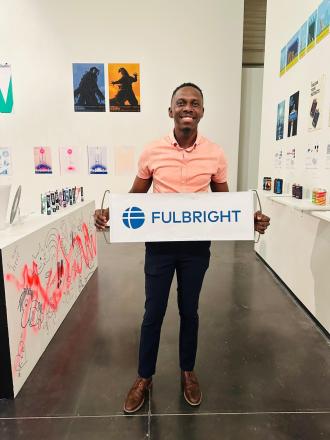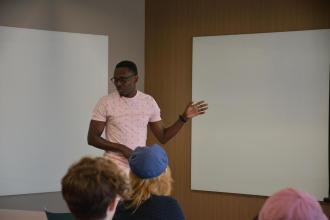Experience-Driven Learning Spans Borders: International alumnus reflects on journey home
KALAMAZOO, Mich. — Deniss Efesper Nkya was 14 years old when he decided he would one day leave his home in Dar es Salaam, East Africa’s largest city, to study overseas. A friend in his neighborhood had been awarded a scholarship for medical school in the United States. It was a life-changing opportunity—one that Nkya was inspired to replicate.
“When he said goodbye, I was like, ‘I want to be like him. One day I will go to the United States or anywhere outside of Tanzania. I want to win a scholarship to study abroad.’”
At that time, the per capita gross domestic product in Tanzania, where Nkya was born, was just under $400. While Tanzania’s economy was growing, the country's development was slow and higher education options were limited. The United States, however, was a much wealthier nation. There were countless opportunities for international students who could find their way here.
When Nkya finished secondary school, he enrolled at the University of Arusha. There, he trained to become a teacher while continuing his search for funding to study abroad. In 2016, he won a scholarship to come to James Madison University in Virginia for a semester.
“It was a competitive scholarship—only three people won it,” recalls Nkya, now 38, speaking from the International Student and Scholar Services Office at Western Michigan University (WMU). “That gave me the confidence that I could do more.”
The Fulbright Foreign Student Program
By 2021, Nkya was working as a school principal. He had married and started a family in Tanzania, but still dreamed of furthering his education overseas. “I knew that I still wanted to study abroad,” he says. “I didn’t know if it was going to be in the U.S., but I was determined it was going to be outside of Tanzania.”
That year, he applied to the Fulbright Foreign Student Program, an initiative of the U.S. Department of State that helps graduate students, young professionals and artists from around the world study and conduct research in the United States. Approximately 4,000 international students receive Fulbright scholarships each year.
Nkya joined their ranks in 2022. He was one of six international students to come to WMU on a Fulbright Foreign Student Award that year, says Dr. Michelle Metro-Roland, associate director of external scholarships and faculty development at the Haenicke Institute for Global Education.
Nkya pursued a master’s degree in global leadership and learning with the College of Education and Human Development. The program prepares graduates to fill in-demand positions in international education, says its director, Dr. Eric Archer, associate professor of higher education leadership at WMU.
Researchers expect nearly 200% growth in global higher education enrollment through 2040, he explains. As a result, skilled professionals in educational and global leadership will continue to be in demand.
Experience-Driven Learning for International Students
After finishing his degree, Nkya applied to stay in U.S. for an additional year of academic training. He secured an internship as a global learning specialist at the Haenicke Institute for Global Education. He organized activities for international students—from soccer matches to orientation—and helped coordinate events and programs to promote international student recruitment and success.
“I was like a big brother to many international students,” Nkya explains, as a smile spreads across his face.
Many of WMU’s 1,200 international students on campus seek post-graduation job training before returning to their home countries, says Dr. Brian Childs, senior director of International Student and Scholar Services at WMU. Currently, around 400 recent international alumni are enrolled in various federal occupational practice and academic training programs, supported by Western in partnership with employers nationwide.
These opportunities are vital for international students, says Dr. Anezka Viskova-Robertson, global learning manager at the Haenicke Institute for Global Education. Providing practical experience in an American work environment helps an international student’s professional development. “These students are prepared by our university and represent a valuable talent resource that should not go untapped," she explains.
“Deniss was specifically hired to strengthen our efforts in engaging international students and to support global learning initiatives,” Viskova-Robertson says. “Beyond his résumé, he consistently demonstrated a warm and caring personality. We needed someone who could genuinely nurture relationships with international students on behalf of our unit, and Deniss was the ideal person for that role.”
A Newfound Confidence, A Global Community
Nkya returned to Tanzania in May. His degree, he says, will open many doors. He is exploring work as a superintendent and also opportunities in Tanzania's growing higher education sector. He has also begun applying to international nongovernmental organizations focused on education, like the United Nations.
Any doubts he once held about his abilities have subsided. Nkya came to the United States and excelled both academically and professionally, something many people will never have the opportunity to do, he says. “I know I’m a good leader—that is what I’m taking from Western. The work I did here really amplified my confidence.”
It's wasn't just academic or professional enrichment either, he adds. Nkya will never forget the friends and community he found on campus. “I’m really blessed," he says, wiping back a tear from his eye. “Many people leave to get their degrees, but what stands out are the skills you bring back. I know that I can make an impact.”
About The Haenicke Institute for Global Education
The Diether H. Haenicke Institute for Global Education, established in 1998, fosters an environment that supports the global engagement of the Western Michigan University community. Its offices assist nearly 2,500 international students and alumni at home and abroad with immigration, student success and post-graduation job training.
The Institute also facilitates short- and long-term study abroad programs for students, faculty and staff. It hosts a variety of global learning activities, such as designing and promoting scholarship and academic opportunities on campus; providing K-12 outreach; hosting lectures, panels and events; and showcasing arts, entertainment and culture from around the world. More at www.wmich.edu/global.



